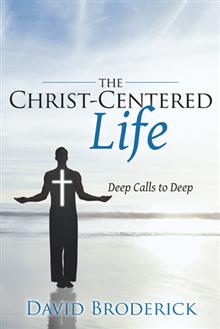Christ-Centered Prayer
This guest article is a chapter from David Broderick’s book, Christ-Centered Life.
If YHWH is the preexistent God, if Jesus is the Alpha and Omega, if the Holy Spirit is the agent who created everything—then prayer begins and ends with God. Prayer is God’s work, not mine or yours or anybody else’s. We do not originate prayer, and it does not belong to us. Furthermore, mature prayer is unknown to us until we learn it. With regard to prayer, we have to learn that we have a lot to learn.
“Those who abide in me and I in them bear much fruit, because apart from me you can do nothing” (John 15:5).
Do we really believe that Jesus meant that? If we can do nothing separated or parted from Jesus, that includes prayer. When we first come to Christ, it may be hard for us to face up to our utter helplessness, because we are so used to living independent lives and looking after ourselves. At that time, we may well have seen Christ as merely a good addition to our lives. But utter helplessness is the way of fruitfulness. Still, we don’t do utter helplessness very well. Fruitfulness in prayer is about developing a relationship through prayer. It is not primarily about an abundance of words or about getting things done.
“It is the spirit that gives life; the flesh is useless” (John 6:63).
Our natural selves are incapable of mature prayer. Learning mature prayer is, by definition, stepping outside our comfort zone. Prayer confined within our comfort zone quickly becomes a repetitive chore. Learning mature prayer means leaving behind that which we know in order to discover that which we cannot even imagine.
“The Advocate, the Holy Spirit, whom the Father will send in my name, will teach you everything, and remind you of all that I have said to you” (John 14:26).

David Broderick describes his book, The Christ-Centered Life: “This book is about my journey into Christ-centeredness, a personal journey that still goes on daily for me and will continue to do so throughout my life. It presents a beginning and a foundation for the journey into Christ-centeredness that each of us can undertake as we grow in Jesus for ourselves. As such, the book gives you some starters and pointers for your own journey into Christ-centeredness. It is my deepest desire that nothing should prevent my readers from seeing Jesus for themselves and having a real and lasting encounter with him that leads to a life of Christ-centeredness.”
If the Holy Spirit will teach us everything, then that includes prayer. Listening to Jesus is a vital part of learning mature prayer. Being led by the Holy Spirit is a huge learning curve for those who value their independence and self-sufficiency. Independent people struggle with being utterly dependent, but if we would explore mature prayer, then we must make ourselves utterly dependent upon the Holy Spirit of God to continually lead us into a deeper experience of prayer. We must make ourselves utterly dependent upon him, with the assurance that the Holy Spirit is not with us to chastise, criticize, or condemn but to lovingly lead us into all things that are ours in Christ. How do we do all of this? By personally continually meeting Jesus.
“Likewise the Spirit helps us in our weakness; for we do not know how to pray as we ought, but that very Spirit intercedes with sighs too deep for words” (Romans 8:26).
In ourselves, we are so incapable of mature prayer that the Spirit must intercede in us and through us. True prayer comes from deep within us. It is much more than just our heads speaking words. This alone should cause us to be careful in our exploration and learning of prayer so that we do not miss or disregard anything—especially that which we do not currently recognize as prayer.
“When you are praying, do not heap up empty phrases as the Gentiles do; for they think that they will be heard because of their many words. Do not be like them, for your Father knows what you need before you ask him” (Matthew 6:7–8).
Words are so very easy—and they are so very easily empty. Empty words do not prayer make, no matter how many words there are. How do we recognize empty words and phrases? What are they? Empty words and phrases come from the mouths of people who do not let God work his change inside them. Jesus was not rebuking the Pharisees because of the quantity of their words but because those words were empty. Words that flow from a heart that will not change are empty words. Therefore, we need to realize that mere words are, on their own, the shallowest form of prayer.
Category: Living the Faith


